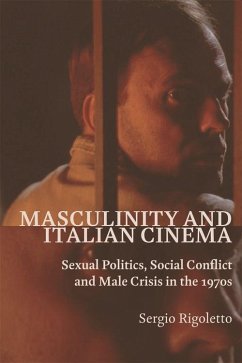'Through careful historicisation, theoretical argumentation and scrupulous formal analysis, Sergio Rigoletto reveals 1970s Italian cinema as a peculiarly rich archive for thinking through the impasses and complexities of masculinity and its representation. This book refreshes and enlarges our understanding of the cinematic and sexual politics of this crucial period.' John David Rhodes, University of Sussex 'Masculinity and Italian Cinema offers a bold and convincing new reading of Italian cinema of the 1970s as a period of self-conscious reflection on the meaning of masculinity. Rigoletto's fascinating close readings of key films and lucid application of theory bring gender politics into the mainstream of Italian film history.' Danielle Hipkins, University of Exeter How did Italian cinema of the 1970s re-envision masculinity in response to sexual liberation? What role did broader socio-political concerns of the time play in this re-definition? To what extent did this re-envisioning of masculinity intersect with concurrent debates about the function of cinema as a political medium and a mass cultural phenomenon? Masculinity and Italian Cinema takes the 1970s as an especially instructive period for rethinking the traditional trope of an inadequate male in crisis within Italian cinema. It explores how masculinity functioned in several films of the 1970s as a charged allegory for the many socio-political lacerations of the Italian nation and as a site of conflict and radical interrogation of ideas about gender and sexuality. Sergio Rigoletto re-examines a number of key films, including Bernardo Bertolucci's The Conformist, Federico Fellini's City of Women, Ettore Scola's A Special Day, Pier Paolo Pasolini's Teorema and Lina Wertmüller's The Seduction of Mimì, in the light of gender and queer theory and considers the challenges that these films pose to received ideas about gender and sexuality of the time, and to some of the aesthetic and narrative conventions which have traditionally regulated the representation of men in film. Sergio Rigoletto is Assistant Professor of Italian and Cinema Studies at the University of Oregon, USA. He has published on film comedy, contemporary queer cinema and Italian television. He is the co-editor of Popular Italian Cinema. Cover image: The Conformist, 1970 (c) Minerva Pictures. Cover design: Barrie Tullett
Hinweis: Dieser Artikel kann nur an eine deutsche Lieferadresse ausgeliefert werden.
Hinweis: Dieser Artikel kann nur an eine deutsche Lieferadresse ausgeliefert werden.








